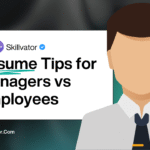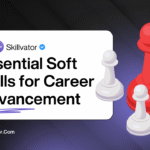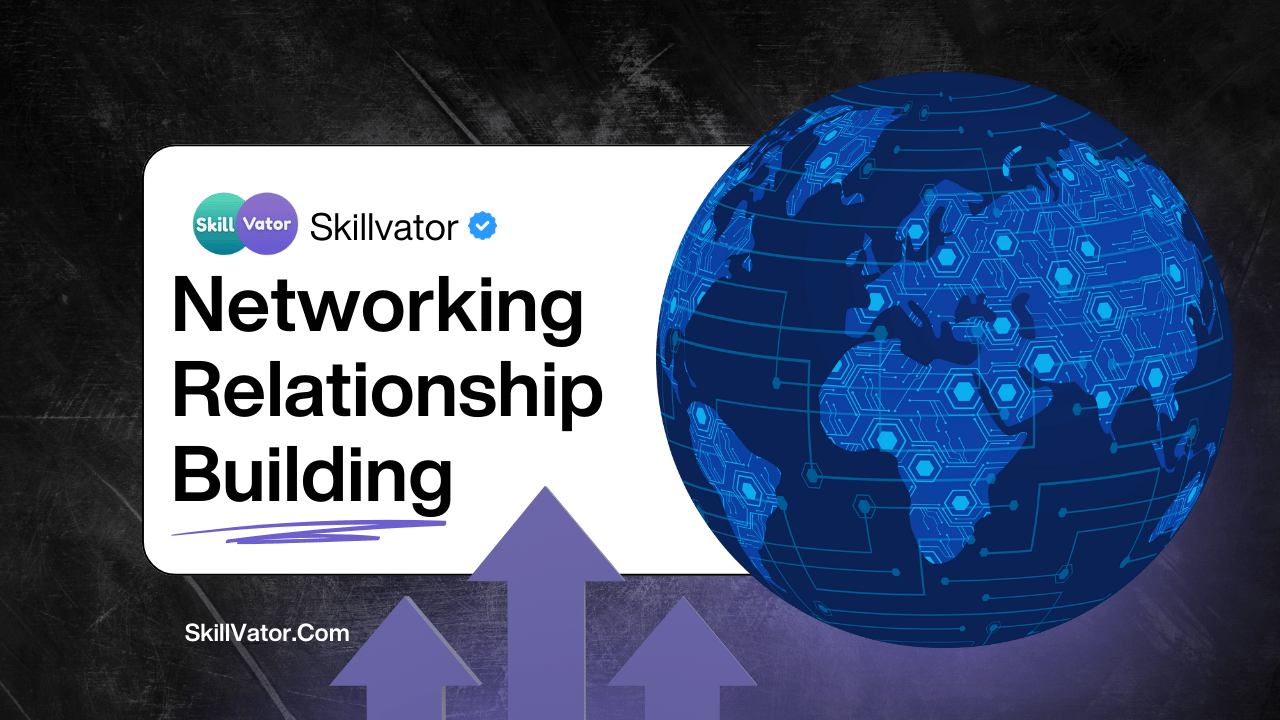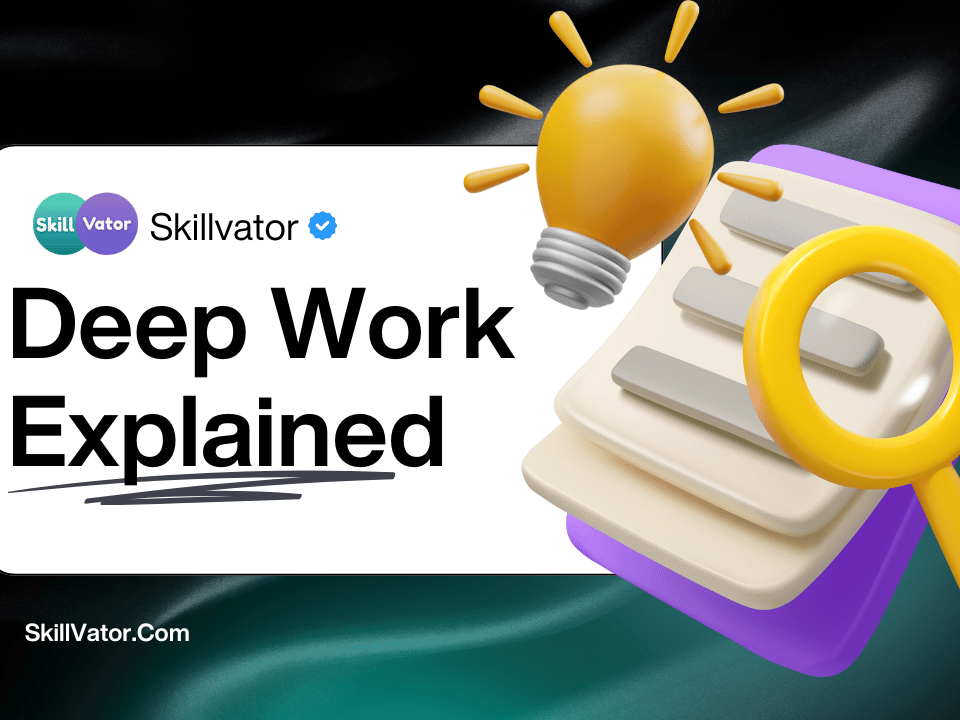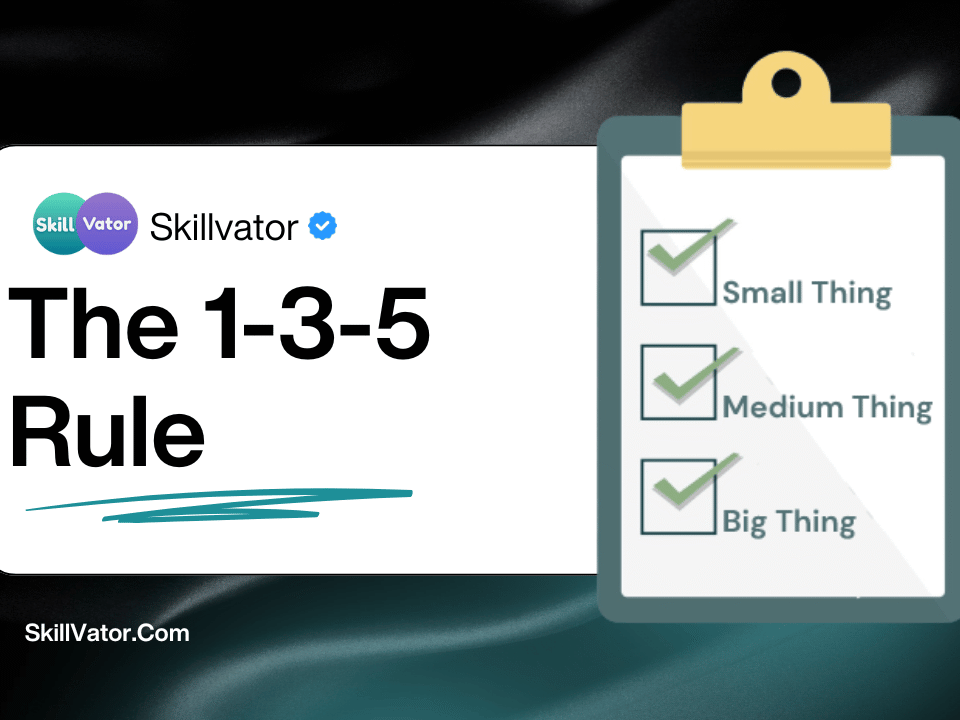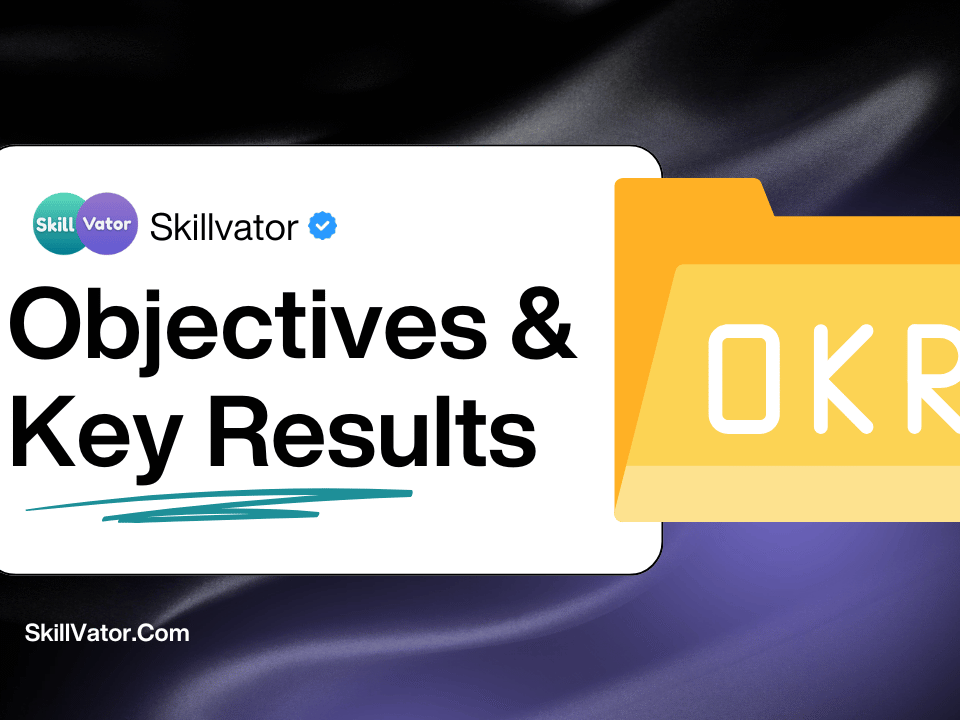In The Crazy Year of 2025, opportunities don’t just appear on job boards or in business listings — they come through people. A former colleague recommending you for a role. A client referral from someone you met at a conference. A LinkedIn comment that leads to an investor meeting.
I’m Raha Heydari, founder of Skillvator, and I’ve seen first-hand that networking is not about collecting contacts. It’s about building strategic, authentic relationships that create opportunities — sometimes years down the line.
Research shows:
-
85% of jobs are filled through networking
-
70% of business deals start from an existing relationship
-
People are 4x more likely to work with someone they trust
This guide will show you how to network with purpose and build relationships that last — whether you’re growing your career, building a business, or both.
The Foundations of Networking and Relationship Building
Strong relationships rest on three pillars: trust, value, and consistency. Without these, no amount of LinkedIn requests will matter.
-
Trust is currency: Without credibility, no connection turns into opportunity.
-
Social capital: Your ability to leverage relationships as a resource.
-
Know-Like-Trust framework:
-
People must know you exist.
-
People must like your presence.
-
People must trust your expertise or integrity.
-
Pro Tip: Start with giving. Introduce people, share valuable insights, or send helpful resources — before asking for anything in return.
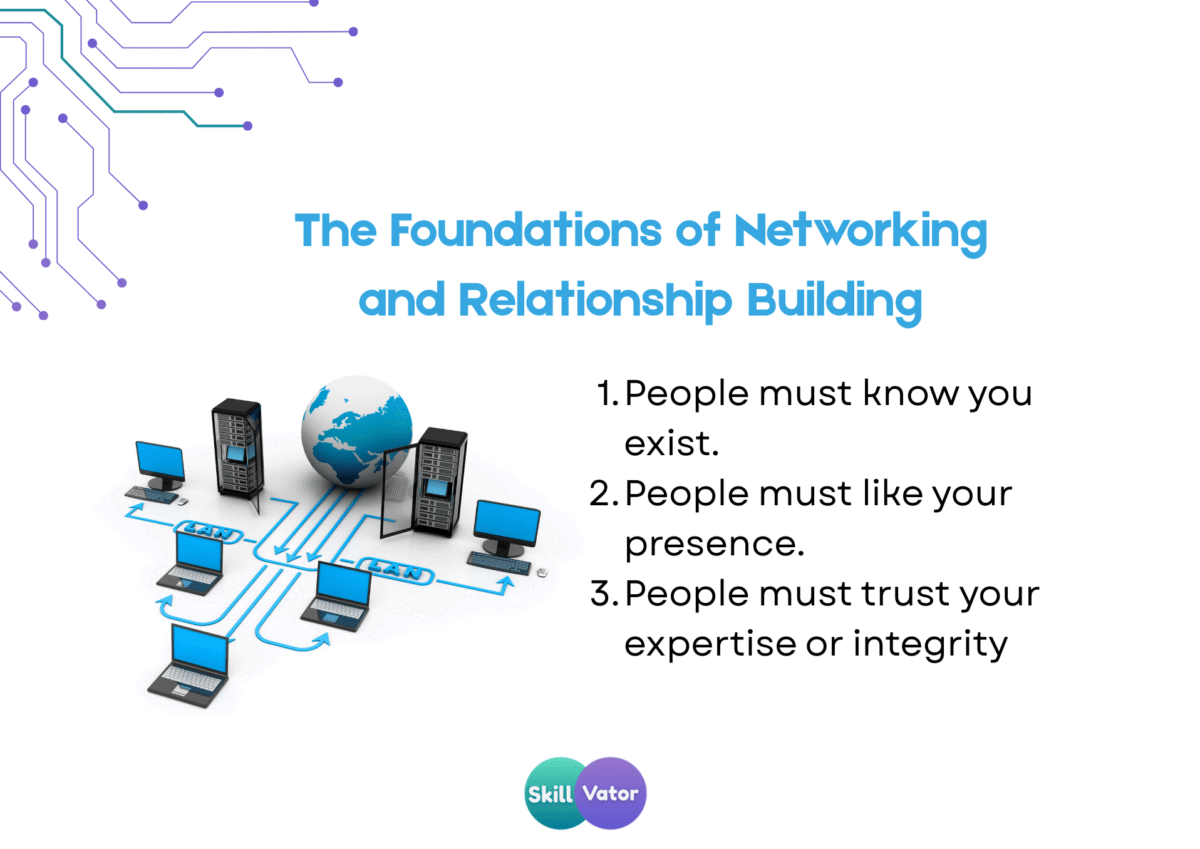
Career Networking vs. Business Networking: Key Differences
| Factor | Career Networking | Business Networking |
|---|---|---|
| Main Goal | Job offers, mentorship, promotions | Clients, investors, partnerships |
| Platforms | LinkedIn, alumni groups, professional events | Industry expos, mastermind groups, B2B marketplaces |
| Success Metrics | Interviews, referrals, skill endorsements | Contracts, revenue, strategic alliances |
| Best Practices | Skill showcasing, targeted outreach | Value exchange, thought leadership |
| Common Mistake | Sending resumes too early | Pushing sales too fast |
You can Also Read: Resume Tips for Managers vs Employees
The Psychology of Effective Networking
Networking is not just socializing — it’s applied psychology.
-
Reciprocity: Give first, receive later.
-
Priming: Share expertise publicly so people associate you with that skill.
-
Active Listening: Makes people feel valued and increases trust.
-
The “strength of weak ties” principle: casual connections often bring the biggest opportunities.
Online Networking Strategies (2025 & Beyond)
1. Optimize Your LinkedIn
-
Use a headline that states your value, not just your job title.
-
Post insights, results, and lessons learned weekly.
-
Engage with other people’s posts — don’t just post your own.
2. Leverage AI Networking Tools
-
AI can suggest ideal connections, draft outreach messages, and track follow-ups.
-
Tools: Crystal Knows, Zopto, Sales Navigator.
3. Join Niche Communities
-
Slack groups, Discord servers, industry-specific forums.
-
Participate in discussions, not just self-promotion.
How to Network at Work Without Being Awkward
Many professionals shy away from networking because they fear it will come across as fake. The key is authenticity. Start by:
-
Taking interest in your colleagues’ projects and offering genuine help.
-
Asking open-ended questions instead of rehearsed “networking lines.”
-
Building relationships slowly, not rushing to impress.
When you focus on being curious and supportive, your connections at work naturally grow stronger without the “awkward” factor.
Offline Networking That Still Works
-
Conferences & Industry Events: Prepare an agenda of people to meet.
-
Meetups & Local Associations: Build rapport locally.
-
Volunteering: Increases visibility and trust simultaneously.
-
Follow-up Ritual: Within 48 hours, send a short personalized note.
Building Strong Professional Relationships
Strong relationships are built on trust, respect, and consistency. A few simple practices can transform how people see you:
-
Always follow through on your commitments.
-
Show appreciation and acknowledge others’ contributions.
-
Offer value before asking for favors—share resources, knowledge, or feedback.
Think of relationships as a two-way street. When you invest in others, you create a supportive network that’s willing to invest back in you.
LinkedIn Networking Tips That Work
LinkedIn isn’t just an online résumé—it’s your professional reputation hub. To use it effectively:
-
Personalize your connection requests with a short note.
-
Share insights, not just achievements.
-
Comment meaningfully on others’ posts to start conversations.
-
Keep your profile professional yet approachable, with a clear photo and headline.
Consistency on LinkedIn builds visibility, but genuine interaction builds trust.
Attending Events and Following Up Effectively
Attending industry events or company gatherings is only the first step—the real magic happens in the follow-up.
-
Within 48 hours, send a friendly message to people you met.
-
Reference something from your conversation so it feels personal.
-
Suggest keeping in touch or even schedule a coffee chat.
Networking without follow-up is like planting seeds and never watering them.
Strategic Networking for Promotions
If you’re aiming for a promotion, networking should be purposeful:
-
Build relationships with decision-makers and mentors in your organization.
-
Showcase your value by sharing your achievements in a humble, impactful way.
-
Offer to contribute to cross-department projects to expand your visibility.
When the right people know and trust you, career opportunities become much more accessible.
Networking for Introverts vs. Extroverts
| Trait | Introverts’ Edge | Extroverts’ Edge |
|---|---|---|
| Approach | Deep, meaningful conversations | Broad, energetic connections |
| Strength | Listening & observation | High energy & approachability |
| Improvement Area | Initiating contact | Listening more deeply |
Advanced Relationship-Building Techniques
-
3:1 Give-to-Ask Rule: Give value three times before making a request.
-
Bridge Introductions: Introduce two people in your network who could help each other.
-
Personal CRM: Keep notes on contacts, important dates, and interests.
Top 5 Networking CRMs
| Tool | Best For | Price Range |
|---|---|---|
| Notion | Personal tracking | Free – $10/mo |
| HubSpot | Small businesses | Free – $50/mo |
| Airtable | Flexible custom CRM | Free – $20/mo |
| Clay | AI-powered contact management | $20/mo |
| Nimble | Social selling | $19/mo |
Finding and Connecting with Mentors
Mentors accelerate your growth by offering guidance, wisdom, and accountability. Here’s how to approach them:
-
Identify someone whose career path inspires you.
-
Reach out with respect and a clear reason why you admire them.
-
Don’t ask for “mentorship” right away—start with seeking advice on one topic.
A good mentorship grows naturally when both sides find value in the relationship.
How to Create a Personal Elevator Pitch
An elevator pitch is a 30–60 second introduction that communicates who you are, what you do, and why it matters.
Structure it like this:
-
Who you are → “I’m a marketing manager specializing in digital growth…”
-
What you do → “…I help companies create strategies that double their online engagement…”
-
Your unique value → “…by combining data-driven insights with creative storytelling.”
Practice it until it feels natural—not robotic—so you’re ready when opportunity strikes.
Asking for Recommendations the Right Way
Recommendations strengthen your reputation, but asking for them can feel tricky. Do it with grace:
-
Ask people you’ve worked closely with, not distant connections.
-
Be specific: “Could you highlight my project management and leadership skills?”
-
Show appreciation and be willing to return the favor.
A thoughtful recommendation can be the credibility boost you need at a critical time.
Joining Professional Communities and Groups
Communities—online or offline—are powerful spaces for learning, sharing, and growing. Whether it’s a Slack group, a local meetup, or a professional association, they:
-
Give you access to collective wisdom.
-
Help you stay up-to-date on industry trends.
-
Provide a safe space to ask questions and get feedback.
Joining the right communities turns networking into a natural part of your growth.
Digital Etiquette in Professional Communication
In a world where much of networking happens online, digital etiquette matters more than ever:
-
Respond to messages in a timely manner.
-
Keep emails and DMs professional, clear, and respectful.
-
Avoid spamming or over-sharing—value your connections’ time.
Your digital behavior reflects your professional character. Respect goes a long way in building strong online relationships.
People Also Ask: Networking FAQs
-
How do I network without feeling fake? → Focus on helping, not selling.
-
How often should I follow up? → Every 3–4 months unless there’s a relevant reason sooner.
-
What if I have no connections? → Start with alumni, colleagues, and online groups.
-
How do I network internationally? → Join global online communities and attend virtual conferences.
Common Networking Mistakes and Fixes
| Mistake | Fix |
|---|---|
| Asking for favors too soon | Offer value first |
| Not following up | Schedule reminders |
| Only networking when job hunting | Make it a habit |
| Focusing only on quantity | Focus on quality |
| Talking more than listening | Ask open questions |
Case Studies: Networking That Works
-
Career: A marketing manager attended a free webinar, asked a thoughtful question, and got a job lead within a week.
-
Business: A startup founder engaged in a LinkedIn group discussion that led to a $50k contract.
30-Day Networking Action Plan
Week 1: Update your online profiles & list top 20 desired connections.
Week 2: Join 2 online groups & attend 1 event.
Week 3: Follow up with 5 people from your list.
Week 4: Review progress and adjust approach.
Final Thoughts: Unlocking Success Through Relationships
At Skillvator, we believe networking isn’t about being the loudest person in the room—it’s about being the person people trust, respect, and remember. Whether you’re seeking a promotion, expanding your career options, or simply looking to learn, your ability to build and nurture relationships will always be a key factor.
Take the first step today: reach out to a colleague, personalize a LinkedIn request, or join a professional group. Every small interaction is a building block toward a stronger, more successful career.

